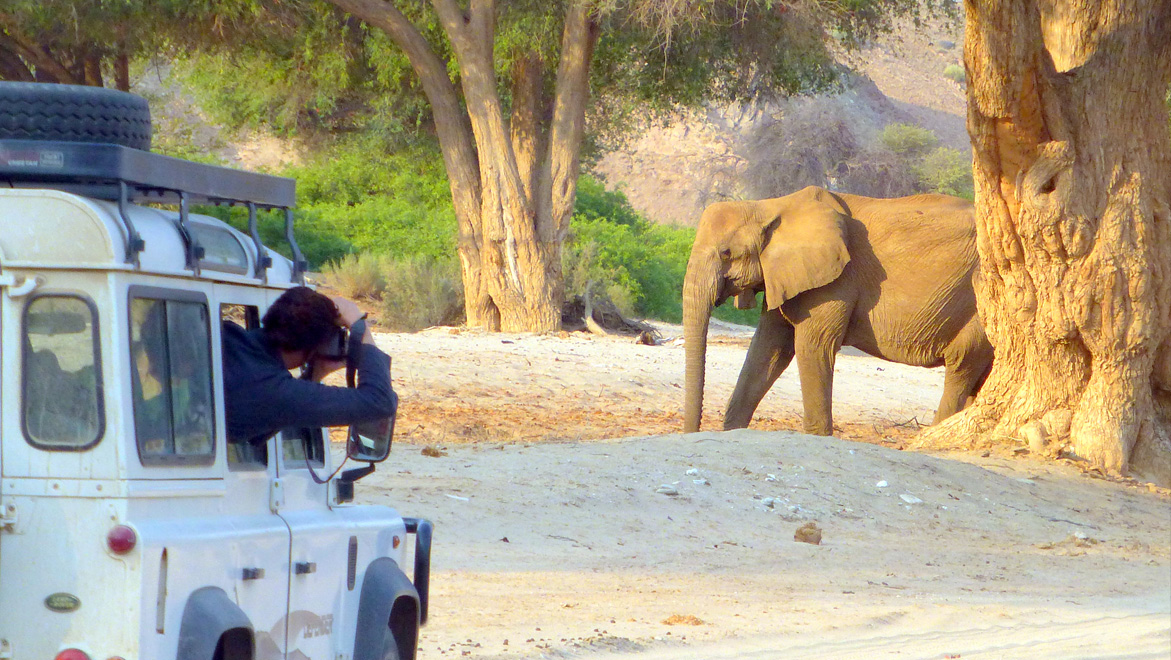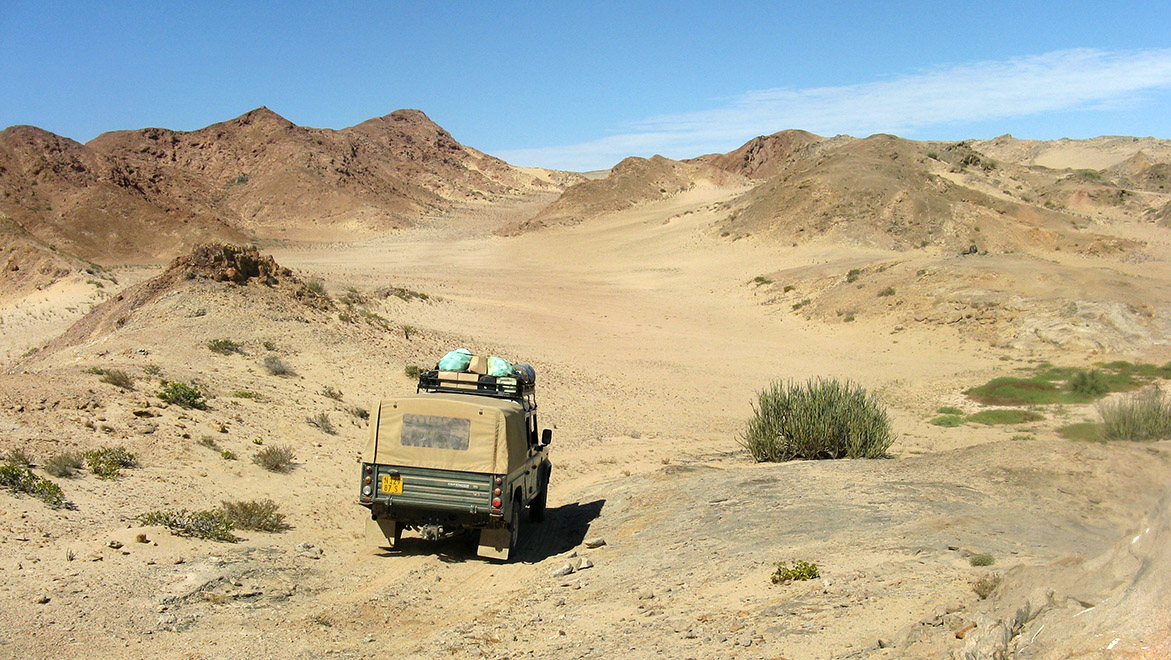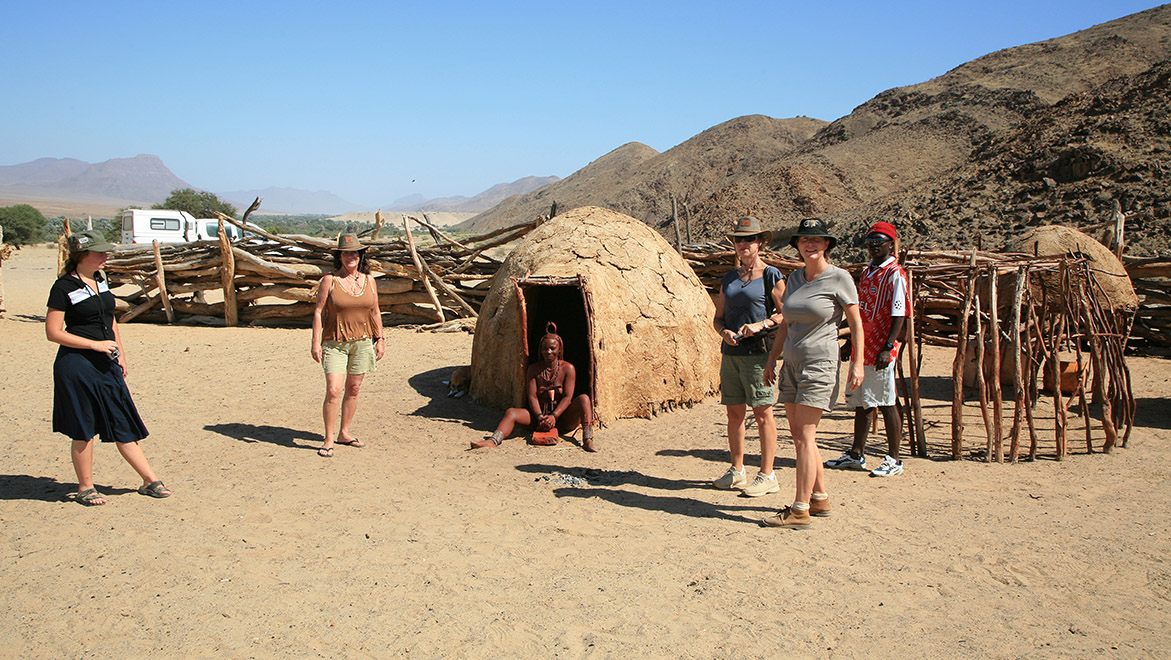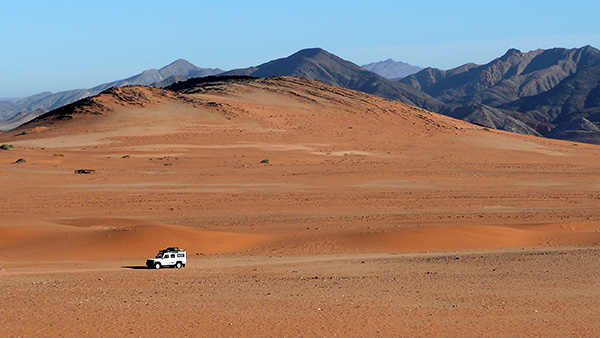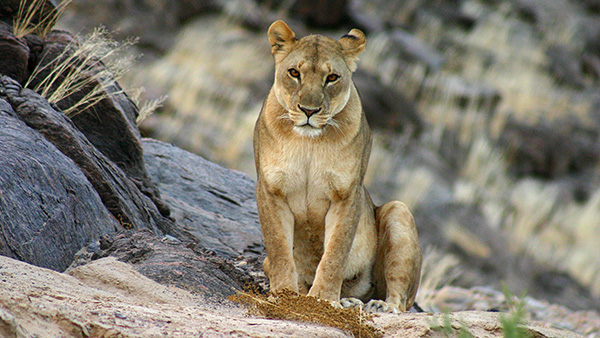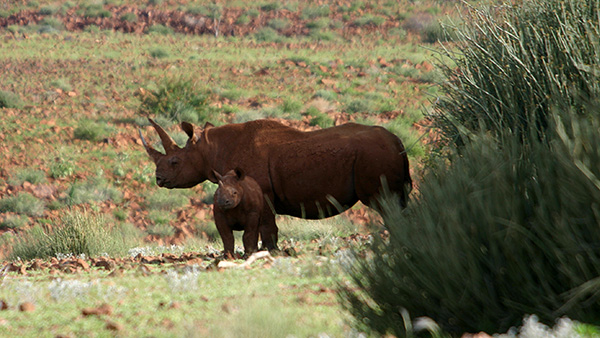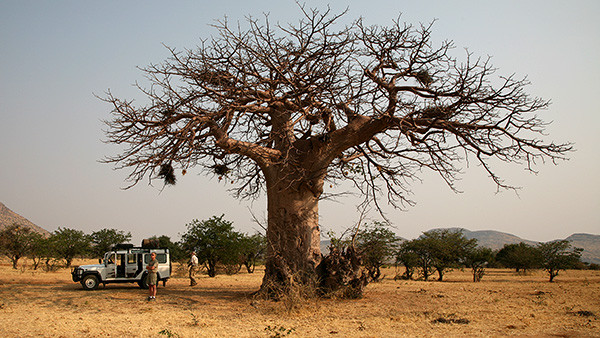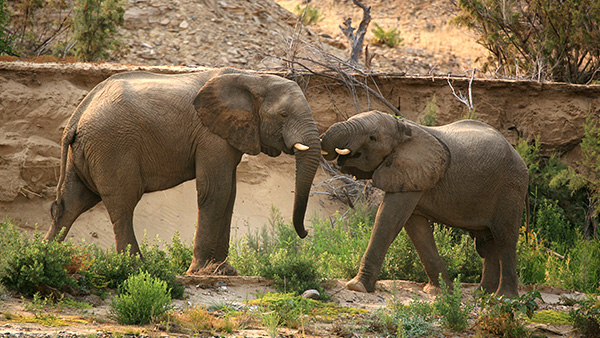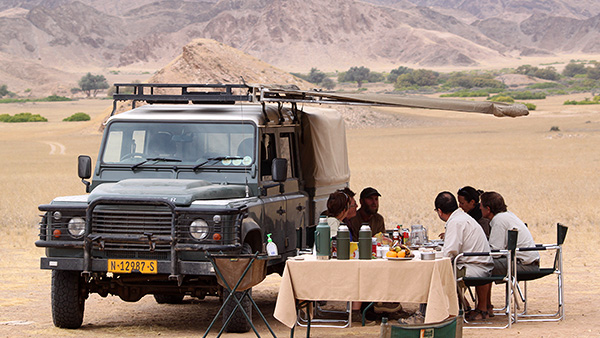Each of our expeditions is custom-designed to suit your party. We don’t do set itineraries as this could limit opportunities that may come up as a result of rainfall, wildlife movements, community events and conservation activities. Options include drive-in/fly out; drive in and out or flying both ways.
Our Expeditions
Your participation in our safaris does not just generate much needed income for the Conservancies; it also serves to provide employment opportunities, capacity building and hope.
We also offer Special Family expeditions, with focus on a learning and growing experience for children over 8.
Here are some of our recommendations:
An expedition to the Kaokoveld with Conservancy Safaris is a journey into a spectacular and amazing region with our team that knows both wildlife and people better than anyone else. You will be travelling on rugged 4x4 tracks to places that few other visitors have been and experiencing this remarkable ecosystem that can often be harsh, but also breathtakingly beautiful.
We deliberately keep the detailed routes and daily activities on all our expeditions and safaris flexible, to enable your guide to adjust them to seasonal wildlife and the semi-nomadic Himba movements, as well as the special interests of our guests. However, the Kaokoveld expedition will include:
- At least one night wild camping in the magnificent Huab river valley, where in the dry season we can almost guarantee great encounters with desert elephants and may see lions. We will also talk to local farmers here about the challenges of living with large predators.
- A visit to Wereldsend, the base camp of IRDNC, where Namibia’s community-based conservation started. Hear how commercial poaching was stopped in the past and what is being done today to address its recent resurgence.
- Tracking black rhino with Torra Conservancy’s rhino rangers, who are the men on the front line of protecting Africa’s most endangered large mammal.
- At least one night wild camping in the Hoanib river valley, the iconic home of Namibia’s desert living elephants, where the successful fight to save them was won in the 1980s.
- One or two nights in the Puros Conservancy campsite, where we will have time to relax in the shade of the large trees along the Hoarusib River’s banks. Elephants often walk through the campsite and giraffe browse in the nearby woodland. We will also have our first contact with Himba people here.
- Driving through and camping out in the desolate, but very beautiful, northern Namib Desert on our way to the Kunene River. This is the most remote part of southern Africa, where we will be on rough tracks seldom used by other visitors to the region.
- Spending two nights in the rustic Etaambura Lodge that is majority owned by five neighboring conservancies, and regarded as one of the most aesthetically designed in the country. It was named by the local Himba community and means “from where you can see the rain” because from the lodge you can see where it is falling in any direction. We need say no more.
- Meeting Himba residents of Orupembe Conservancy in their homes and during their herding activities, and having dignified and mutually respectful interactions with them. We will also have a senior member of the community acting as our host during our stay at Etaambura.
- Returning by a different, but equally scenic route.
- For 14 day expeditions only: Camping on the banks of the Kunene that forms the border between Namibia and Angola. The Kunene is the least known and most spectacular river in Africa, with only four vehicle access points over its last 200 kilometers to the sea. Actually there is a fifth, known only to Garth and very few others, which is where we will be camping.
- As we try to build in a good walk on most days, please don’t forget your hiking boots. Very importantly, with Garth as your guide, backed up by modern emergency services, you will be as safe as it is possible to be in such a remote environment. And with Sonia Hambo’s fire cooked cuisine and our large, comfortable tents, camping out will be a pleasure. Many guests have called their Kaokoveld expedition with us “a holiday of a lifetime.”
PLEASE NOTE: The length of the Kaokoveld expedition has been increased from 10-11 nights to 12-14 nights to reduce the daily time spent in a vehicle – the only complaint we have received. We have also dropped the two nights in Etosha option, as many guests found the national park restrictions an anti-climax after the freedom experienced in the Kaokoveld. However, a visit to Etosha can be added on to this or any other proposed safaris on request.
Expect to spend some days driving through and camping out in the major wildlife areas of Torra, Anabeb, Sesfontein and Puros conservancies. The focus will be on finding elephant, lion and black rhino. The latter often requires tracking on foot with two of a conservancy’s rhino rangers – men who have been appointed by the local community to monitor and protect this highly endangered species from poachers. You will also visit at least one of the conservancy offices to hear from the staff why and how they are now conserving wildlife and the benefits and challenges it brings.
A night or two will be spent in the rustic Etaambura Lodge in Orupembe Conservancy, who own a 40% shareholding in it, with the other CSN owner conservancies holding another 30%. Orupembe receive N$160 for every guest/night spent at the lodge. Etaambura is in Himba country and while staying there the conservancy provides a host to join you at dinner to answer any questions you have about local culture and living as a semi-nomadic pastoralist.
He will also take you on a scenic walk to where cattle are being watered, and women gather to discuss domestic issues, or have their hair done the traditional way in a salon under a mopane tree. On the walk to the waterhole your Himba host will also explain the local uses of many plants growing along the way, some of them endemic to the region.
On request and if there is time to arrange it, on our way back from Etaambura we could spend a night as guests at a Himba village in the Sanitatas or Okondjombo conservancies - both also co-owners of CSN. See how cattle, goats and sheep are managed in the evening and early morning, and how the whole family, including small children, take part in the action. We will take a different scenic route back to Swakopmund (or Windhoek by arrangement), again camping out in memorable places.
We go into the heart of the Himba area, south of the Kunene River between the Ruacana and Epupa waterfalls. Here the rainfall is much higher and the older men and women have been able to retain most of their traditional dress, religion and pastoralist way of life. But like indigenous people all around the world they are today facing a seductive onslaught from our modern consumer society, which is spearheaded by a western education system that has little respect for alternative lifestyles. In the past two decades widespread overgrazing and degradation of the rangeland their livestock depend on, has also increased their vulnerability to the changes they see occurring around them.
We have longstanding links with traditional leaders there who have been standing up for their rights over the land and its resources. Through them you will be introduced to the authentic Himba world view, and visit villages where the inhabitants have made few compromises with the European way of life.
But this safari is not just about the past. We will also go to a local primary school where Himba children are learning to read and write, making them better equipped to meet the many challenges of the future.
Because overgrazing has had such a devastating impact on the Himba’s pastoralist economy, a visit to where traditional livestock herding practices are being re-introduced to address the widespread loss of perennial grasses can also be made. However, some of what we do will be opportunistic and based on what is happening.
As our main focus is interacting with Himba communities we will mostly be camping out close to them. Other places of interest are Epupa Falls, the Ehomba Mountain with its many strong springs, which was the home of a family of Zulu origins who migrated across the sub-continent with the “Thirstland Trekkers” in the 19th century. And not least, Opuwo, a dusty, unlovely town where old meets the modern, as traditionally dressed Himba, Zemba and Hakahona women mingle in its streets and supermarkets with Africa’s new urban generation wearing the latest western designer clothes.
Although most of the wildlife on the Kaokoveld highlands was killed in the 1970s, since the formation of communal conservancies many species that previously occurred here have been re-introduced. Elephants are also making a comeback, but are still seldom seen from the road.
Specialist Himba Safaris that are longer than eight nights have an option of descending the escarpment and spending the last days in the wildlife rich west of the region.
Although the Himba as a whole are a society in transition, the lives of the people we will be visiting are still largely governed by the ways of their forefathers, and in spite of the pressures the modern world is exerting on them, their ancestor’s spirits still play a major role in their lives. If this will be so when the present generation passes away is unpredictable, but the opportunity that Conservancy Safaris offers both to academics and interested laymen to learn about and have a dignified dialogue with one of the most colorful and traditional people on the continent is unequaled by any other tourism operator.
2024 Rates
3 OR LESS GUESTS N$32,450
Rates is per day for 3 or less guests
4 OR 5 GUESTS N$9,350
6 OR MORE GUESTS N$8,580
Rates are per person per day for 4 or more guests
Please enquire for SADC resident discount
Included for days of safari - 4x4 transport and fuel, accommodation and meals, back-up team, drinks and guide
Excluded: Bank payment transfer fees, flights to and from Namibia and inland flights, tips.
Payments 25% to confirm booking; 75% - balance of invoice - 60 days prior to start of safari.
General Information
Expeditions and safaris to Kunene Region preferably start and end in Walvis Bay, which has daily flights to and from Johannesburg and Cape Town. Accommodation in charming Swakopmund can be arranged for you. Safaris can start from Windhoek by arrangement.
Drive in/ fly out options also possible on all safaris, and highly recommended. Charter flights are expensive and they will add considerably to costs (at least N$30 000 for a plane seating four guests, depending on where the bush strip is). The length of all trips can be increased beyond the recommended number of nights, but shortening them will mean more time spent driving in a vehicle each day.
Zambezi (formerly Caprivi) safaris can end at Victoria Falls, Livingstone or fly in and out from Katima Mulilo, capital of Namibia’s Zambezi Region.
Please also view our Terms & Conditions
